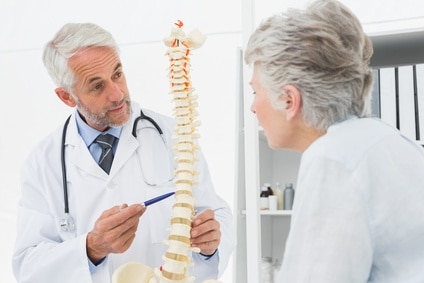Aging and Maintaining Healthy Bones

Most people dont usually think much about their bones or the health of their bones as they go through their daily routines unless something unfortunate happens. Yet having and maintaining healthy bones is essential to virtually every aspect of our daily lives. They are the framework upon which we are built. They protect our organs, produce blood cells and store our calcium.
Bone Basics
Bone formation starts 6 months after conception and reaches full development in late puberty, however your bones continuously develop or remodel over the course of your life. Like the other cells in the body, your bone tissue continuously renews by breaking down the old and replacing with new bone. Ninety percent of the mass and density that make up the strength of our bones is acquired in girls by age 18 and by age 20 in boys and until we are around our mid thirties, new bone growth happens at a greater rate than bone loss. As we age beyond that, the process will continue but you will lose slightly more bone mass than will be replaced.
The word Osteoporosis is a translation from Greek meaning porous bone and is a condition that develops when bone calcium is removed much quicker than it is replaced, leading to fragile bones that are thinner and more likely to break. Osteoporosis occurs in everyone to some degree as they age, but the rate of progression and the effects can be slowed with early diagnosis, lifestyle changes and treatment.
Your skeletal development when you are young determines your bone health for the rest of your life but there are still ways to maintain your aging bones later in life. Understanding what factors affect the health of your bones will help you to know how to take care of them.
Diet
Calcium is a main component of bones so include it in your diet. Recommended daily amounts are 1000mg per day for adults and 1200mg for men over 70. Since women begin to lose bone calcium at a higher rate than men once they go through menopause, 1200mg per day is recommended after age 50. Good food sources of calcium: dairy products, dark green vegetables such as broccoli or kale, sardines or salmon with bones, nuts such as almonds and soybean products like tofu.
Vitamin D is necessary for your body to absorb calcium from your food. Adults should consume 600 international units (IUs) per day and people over the age of 70 should consume at least 800 IUs daily. Good food sources of vitamin D: eggs, liver, fortified foods like milk and fish such as herring, sardines, salmon and tuna.
Calcium or vitamin D supplements may also be needed to reach the right balance. Talk with your doctor about how much you personally need, as taking too much may be harmful.
Physical Activity
Getting exercise is one of the best ways to slow or prevent problems with muscles, joints and bones. Physical activity causes the weight-bearing stress that actually stimulates your bodys bone-forming cells, helping to grow and thicken your bones at any age. Playing sports, weight lifting, jogging, stair climbing, dancing, gardening or even just going for a walk and being as active as possible, as regularly as possible will benefit your overall health and help slow bone loss.
As you get older, it would be wise to consult with your health care provider to assess your capabilities and limitations so you know what precautions to take before beginning a new exercise program.
Lifestyle
Try to maintain a healthy weight for your body size and type. People who are underweight have a higher risk of bone loss while older people who are overweight have a higher risk for falling. Both smoking and heavy alcohol use can each reduce bone mass and increase your risk for a broken bone.
As you get older you can take steps to minimize the risk of a fall or broken bone in your own household depending on the state of your physical health. Remove tripping hazards and obstacles to your mobility or add safety features such as extra lighting, grab bars and non-slip mats where they are needed.
There are many other factors that can affect bone health, such as body size, race, family history or other health conditions. Talk with your doctor about what risk factors relate to you, whether you should be taking supplements or other medicines to strengthen your bones or if you should have a bone density test done. It is a safe, painless test that all women over age 65 and men over 70 should have to to assess your bone health.
Youre never too old to improve the health of your bones.
More questions?
Want to speak to a care expert about how to ensure the safety of your loved one during these uncertain times?
Let's connect you with the closest available Qualicare expert in your city to answer your questions.
The Qualicare Difference
Comprehensive care planning led by experienced Care Experts
"Qualicare changed everything. Mom loves her new companion, meanwhile Jack and I have peace of mind and more time to focus on the kids. "
Janette Aldermaine


 Have Questions?
Have Questions?